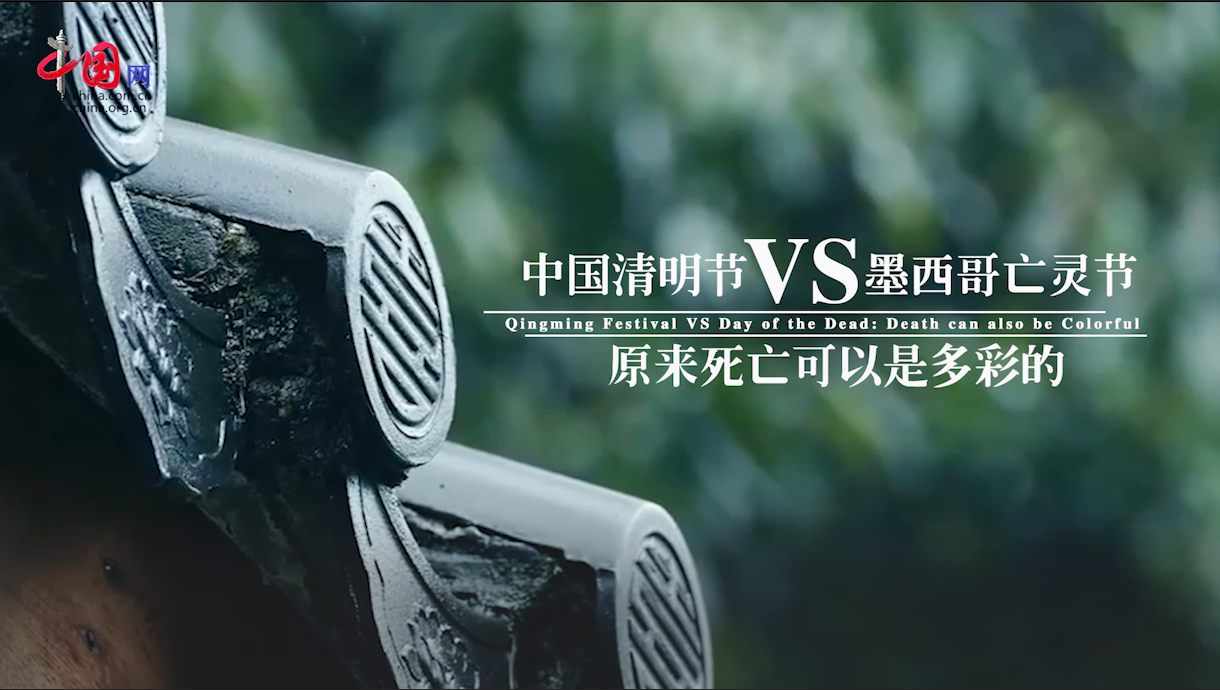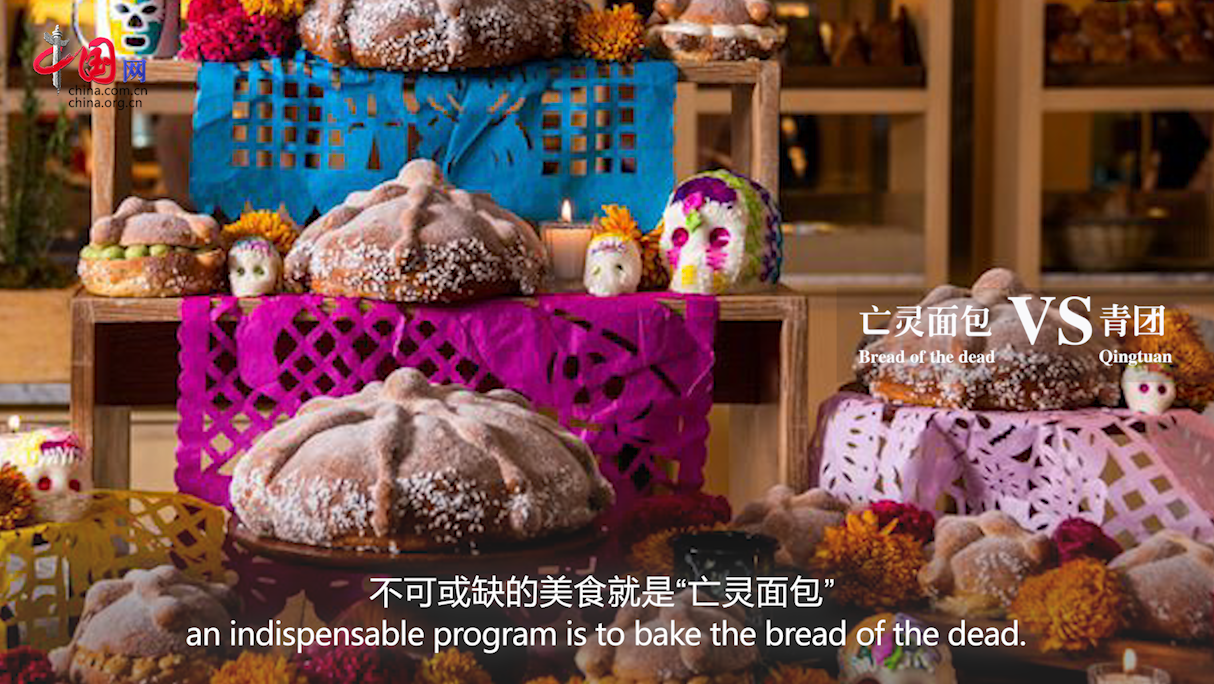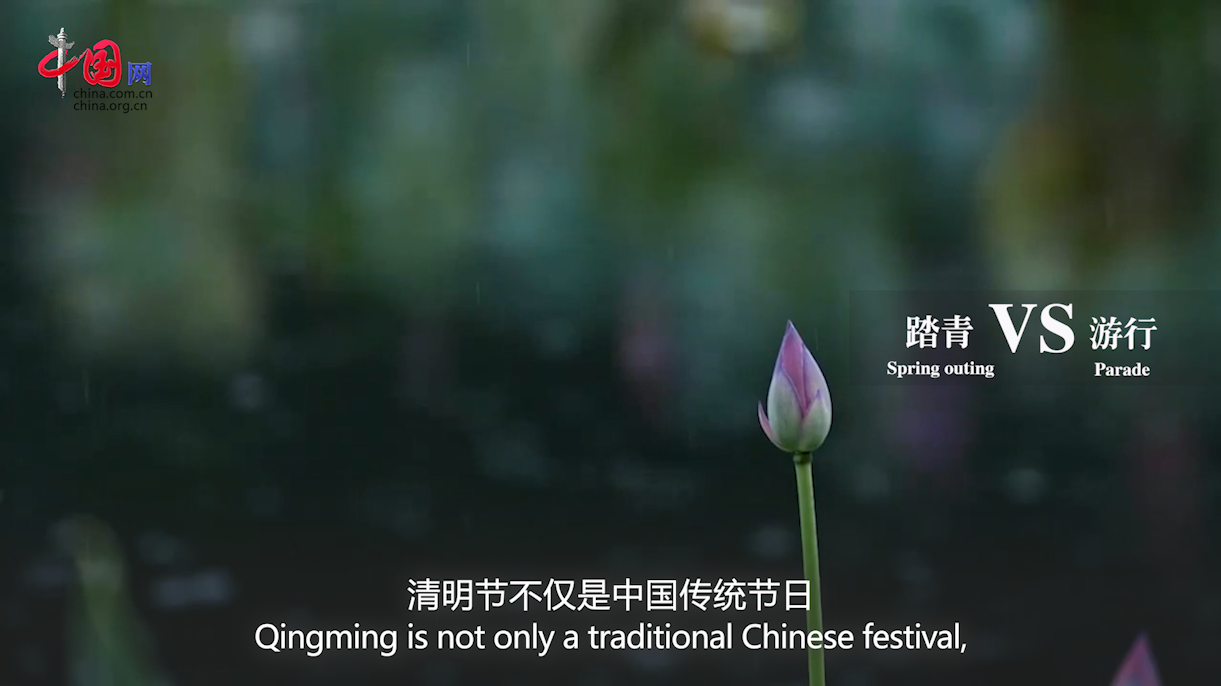中國清明節VS墨西哥亡靈節:原來死亡可以是多彩的
又是一年清明時,在中國人的傳統觀念裏,“死亡”是比較避諱談及的,情感上也帶有些許的傷感、沉重。然而在大洋彼岸的墨西哥,人們對於死亡的理解卻大不相同。同樣是祭祀祖先的節日,中國清明節和墨西哥亡靈節有何不同呢?且聽小編來給你説説!
It is Qingming Festival again! Traditionally, "death"was more of a taboofor Chinese people during daily chats,and was also associated with sorrowful and heavy emotions.But across the Pacificin Mexico,the understanding of death is quite different.Both are holidaysfor worshiping ancestors, how aretheQingming Festival and the Day of the Deaddifferent?Let’s find outtogether!

清明節在每年的4月5日左右,正值春季萬物復蘇之時。亡靈節則在11月初,分為11月1日“幼靈節”和11月2日“成靈節”。
The Qingming Festival takes place around April 5theveryyear, a time when spring brings life back to all beings.The Day of the Deadis traditionally observed at the beginning of November, including the Day of the Little Angelson November 1st, and the Day of the Deadproper on Nobember 2nd.
哀思VS喜樂
Sorrowful thoughts vs. Joyful celebration

清明節,祭祀是重要的習俗,人們來到逝者的墳墓前,進行供奉祭品,焚燒紙錢,叩頭祭拜等儀式活動。小到一個家庭掃墓、一個家族祭祖,大到國家範圍緬懷先烈,向逝者表達哀思。
A crucial part of the Qingming Festival is the worshipping of ancestors. As a tradition, people would visit the graves of the dead. The observance might include placing offerings, burning spirit money,kneeling down to offer prayers, and so on. From members of family or ancestors of a clan, to martyrs of the country, our thoughts are with all of those we respect.
亡靈節則更像是一場慶祝生命和死亡迴圈的狂歡。正如電影《尋夢環遊記》中,亡靈節當天,人們在家裏精心佈置祭壇,用萬壽菊為亡靈鋪路,寓意指引亡靈回家,營造一種愉快的節日氛圍。
Meanwhile, theDay of the Deadis more like a carnival celebrating the cycle of life and death. As in the movie "Coco", onthat day, people carefully arrange altars at home, which are decorated with marigolds.These flowers are thought to attract the souls of the dead home, while also creating a joyful festive atmosphere.
值得一提的是,兩種迥異的祭祀文化中,卻隱藏著一個共同點,祭祀品中都以菊花表達情感寄託,你發現了嗎?
Interestingly, one hidden similarity connects thetwostarklydifferentworshipping cultures.That is, both use chrysanthemumsasofferingsto express the loving emotions for the dead.Did younotice it?
亡靈麵包VS青糰
Bread of the dead vsQingtuan

墨西哥人慶祝亡靈節不可或缺的美食就是“亡靈麵包”。麵包上的長條狀裝飾代表著“骨骼”,頂部中心的小圓球代表著“頭顱”。骷髏和骨頭是亡靈節的標誌,在墨西哥人眼裏,骷髏是生命的起源,締造新的生命。
When celebrating theDay of the Dead, an indispensable program is to bake the bread of the dead. The elongated dough decorations on the bread represent bones. The ball of dough in the center is the skull. Both the skeletons and the skulls are symbols of the festival. Actually, in the eyes of Mexicans, skeletons are the origins of new lives.
而在中國人看來,骷髏多少有點兒“嚇人”。中國清明節的傳統美食是“青糰”,採用青艾汁液拌進糯米粉裏,包裹豆沙餡而成。青糰寓意著團圓,也是為了紀念先人,表達思念。
For Chinese however, skeletons are more of less“creepier”. During the Qingming Festival, they traditionally make Qingtuan, a glutinous rice ball,dyed green with mugwort juice, and stuffed with red bean paste. Qingtuan shares a character with the Chinese word“tuanyuan”, or reunion. Therefore, it is also a way to commemorate the ancestors and express our love.
踏青VS遊行
Spring outing vs. Parade

清明節不僅是中國傳統節日,也是中國二十四節氣之一。這一天,春回大地,一派生機勃勃的景象,因此,踏青是清明節另一個重要的習俗,寓意著生機和希望。
Qingming is not only a traditional Chinese festival, but also one of the twenty-four solar terms. It is when spring brings back life to all. That’s why people considertaqing, or spring outing, as another essential tradition of the festival, as it symbolizes vitality and hope.
墨西哥人則在這一天,穿著五彩繽紛的服飾,裝扮成骷髏的樣子,載歌載舞,表達著對生命的敬畏。
Whereas on the Day of the Dead, the Mexicans would put on colorful costumes or disguise themselves as skeletons. They pay their respect and appreciation to life through singing and dancing.
雖然清明節和亡靈節在習俗上有很大差異,但仔細想來,兩個節日都表達了對逝者的懷念和對生命的敬意,也都體現著家族的凝聚和文化的傳承。值此中國清明節之時,道一聲“安好”,可否?
Despite the stark differences, the Qingming Festival and the Day of the Dead both convey our thoughts and respect to the deceased, and represent unity in kinship and inheritance of cultures. At this traditional Chinese holiday, please accept our sincerest regards. May you have a peaceful and healthy Qingming Festival.
